12-1-23
The Shadow of the Sun: The Brilliance of Resilience
By Diane Sippl
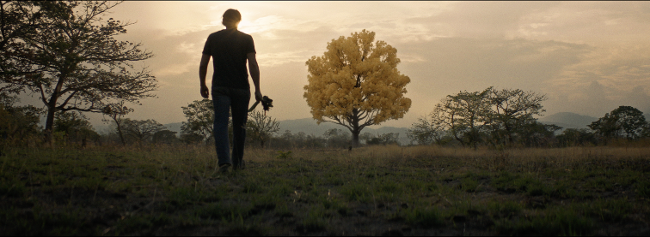
It’s not so often that a film from Venezuela comes to Hollywood, let alone a debut feature by a screenwriter-director-editor-producer who is working mostly with first-time actors. For that reason alone, Venezuela’s submission for the 96thAcademy Awards Best International Feature category defies expectations even in the irony of its title, The Shadow of the Sun. Such words might invite a knee-jerk connotation of a developing country bowing to the glory of the “film capital of the world,” which itself does its part to drive the socio-economic politics of the empire of “America.” It’s easy to see Venezuela deep in that shadow, given that over the last decade, not least in response to U.S. embargos, this southern neighbor has endured ever-increasing poverty, hunger, and illness leading to the displacement of its people. Yet the sweet beauty of Miguel Ángel Ferrer’s The Shadow of the Sun lies precisely in how he subverts the whole defeatist trope of his homeland.
And this he does without ever eliding the daily obstacles to survival there; in fact, he shores them up, but in the most paradoxical way. This beguiling film is really the story of two brothers, and once again, its creator subverts the expected dynamic. Brawny and street-smart Leo (an incandescent Carlos Manuel Gonzalez), well into his thirties, would appear to lord it over his kid brother, wiry and pint-sized Alex (sparkling newcomer Anyelo Lopez), who is not only younger but was born with a loss of hearing. Given their parents’ death, Leo, long estranged, comes to look out for Alex as his father, brother, and guardian alike, and the slurs and offenses against Alex, in all his innocence, are significant. Facing one fight after another to keep his own manual labor jobs and an income, Leo is flabbergasted by Alex’s whim to write lyrics for a song for Leo to sing in a contest in Caracas. It looks like a hair-brained scheme to make money.
“We could win,” Alex entreats him. “I’ve heard you sing!
“You heard me? Are you crazy?” Leo growls. “What kind of drugs are you on! People are dying of hunger out there and you’re thinking about fantasies? I told you they want to take the house away from me—that if I don’t pay them in two months what I make in one year, they’ll kick me onto the street. Come down from that cloud, bro.”
But it’s the beginning of something here, something different.
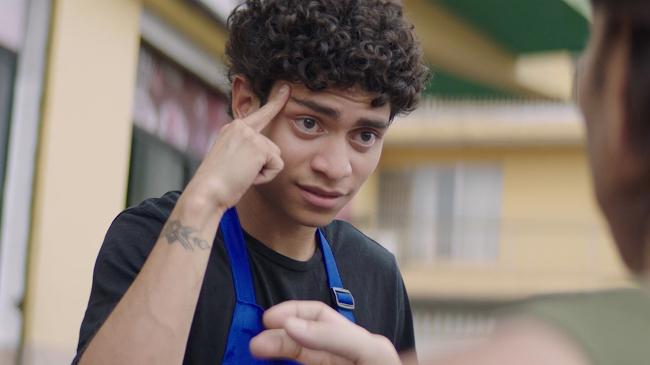
And that something is not a Hollywood rags-to-riches, feel-good movie of two brothers making it to the “big time.” There is no show-biz here, because it’s not the quest; there’s no making it “to the top” because the challenge is something else, discovered along the way. And there is no following in Big Brother’s footsteps, because it’s the little guy who knows the way to stake out a new path.
What Miguel Ángel Ferrer wants to do is to show us his country—the downtrodden, the struggling, the victorious whose victory is self-knowledge, faith, and resilience. In the remote rural town of Acarigua, once the capital of its province in the northwest of Venezuela, life becomes more defeating every day. We might see people bribe, barter, and steal just to stay alive—bribe a naked priest with a water-bucket rinse when his outdoor shower cuts off, barter fresh-baked bread and donuts for relief from gang harassment, steal the electric energy from street power lines to set up a sound-studio for ad-hoc band rehearsals.
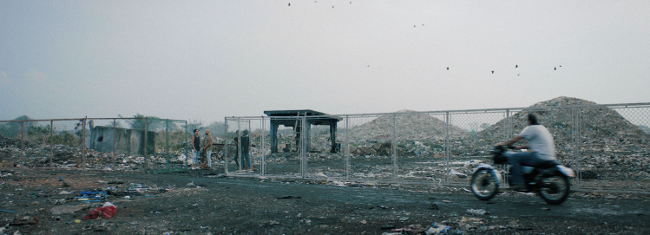
We enter the outskirts of Acarigua in the opening image, one of the film’s many sprawling panoramic shots across its wide screen: a horizon lined with oil derricks and tanks, and a road. Sputtering along on that empty road, Leo is stuck when his motorbike gives out. Late for work, sneaking into the factory, warned by his boss, Leo is already teetering. Henpecked at home and finally fired when he slugs a workmate who taunts him by mocking Alex, Leo is down and out, so he drowns himself in beer at the bar. But something alarming happens, the biggest burst of sound in the film—a gang leader threatens him to either sing or lose his teeth. As the gang circles in on him, Leo’s gravelly, drunken rumble, “Confess all your sins, and I’ll stand by your side,” soon astonishes as a tenor’s overwhelming aria, “I only… I only… ask… That you have…FAITH.” Doors open along the dark, deserted streets for neighbors to take in his voice. It’s a wonder.
Alex has another way of expressing the same plea when he explains to a new-found friend, Brayian, all his pent-up resentment as a child when he couldn’t defend himself against ridicule and ostracism. A teacher gave him a book he could devour.
“When I read those words,” signs Alex, “I felt that I could see, that I could hear, that I could fly, anywhere I wanted to in the whole world. What people said didn’t matter anymore because they would never get to see the places that I was seeing. The world. And now I’m the creator of that world.”
“Which book was that?” asks Brayian.
“I’ll tell you another day.”
And when Brayian begins another question, Alex expresses to him that he can read lips.
“Then read this…” Brayian invites, and the camera shows only Alex’s reaction, which is enough.
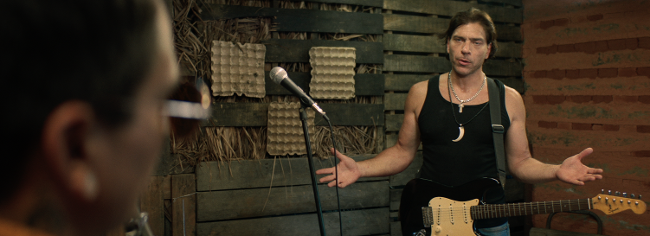
We begin to notice something about agency in the film—how people are likely to second-guess an individual’s lack of capacity only for it to be surpassed before their eyes, or ears. Just as Alex’s deaf female friend may not know that Leo can sign until he replies in her language to her raves about his physique, Leo and Yolanda (an utterly convincing Greisy Mena) have yet to discover that Alex can read lips—and not only that, he can roar like a lion.
There are plenty of key moments when the film gives us limited access to sound, and that is to present the world as perceived by Alex, sometimes with an extremely slight audio sensation, but one of vibrations just the same, and sometimes through his visual point of view with his acute sensitivity to image and context. Yolanda’s facial expressions and gestures alone are a give-away to her avaricious jealousy of Alex and her bull-dogging of Leo. Presumed lack of agency is a source of the highest drama in The Shadow of the Sun, the cornerstone of the conflict, and it is Alex who confronts both Leo and Yolanda with the extent to which she strips her husband of his confidence—“You take away his shine.” It’s heart-rending to see this paradox in Leo, a man who would appear to be so strong; and yet it’s life-affirming to see the challenge coming from the “little brother,” who would appear to be so weak. What we have, essentially, is a deaf poet giving a mute singer his voice! But it doesn’t stop there….
In his particular film language, Miguel Ángel Ferrer generates some refreshing new ideas of sound and voice. He re-defines “sound” as an inner capacity to listen, to hear, and to dream. Sound is no longer the volume of the film, but its point of view, which is one of self-knowledge and mutual respect. “Voice” becomes an expression of oneself regardless of others who are bigger and stronger, or maybe macho but willfully ignorant or indifferent or hostile. Voice is a vehicle in many types of language: one of visual perception (signing and lip reading for Alex), one of tone (operatic for Leo), one of music (for Acarigua’s town folk, who either rehearse in Alex’s band or improvise in the park with a harp, tamboras, a cuatro, African drums, mandolas, and maracas).
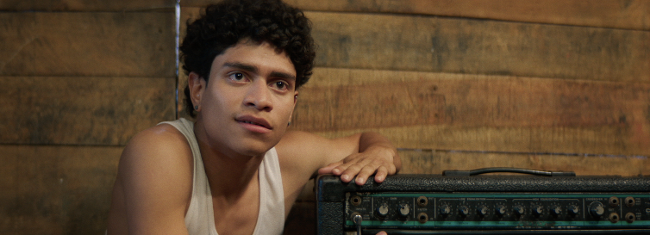
The ironic play with sound and silence escalates in the film as its lyricism grows. A lot more conflict erupts, and then settles, for better and worse. With all the angst of daily life, the passionate determination and the dogged perseverance we witness, we expect to be delivered to a full and radiant performance of the brothers’ song by the end of the film. As it turns out, that deliverance is not one of a rollicking musical competition, but a metaphorical one, “winning” re-defined as having taken a new road, one to self-potential (with a little brother in the sidecar), and it radiates beyond the stage and even the brothers themselves. Alex’s “song without words” (we never hear them or discover them, even if we see Leo sing them, as Alex does) voices a wish and a hope for Acarigua, its citizens having succeeded in releasing their own voice, showing themselves to the world, enacting their story, by making the film.
The multi-faceted acting here is superb, all around, whether as aural speech or visual signing, and whether from professionals or local participants. Jose Duque’s wide-screen lensing never misses an opportunity to capture the landscape of Venezuela—natural, cultural, and psychological—in a work bearing heart and soul by co-writers Miguel Ángel Ferrer and Guillermo de la Rosa. Music by Sandro Morales Santoro and sound design by Enrique Díaz go hand-in-hand as they invent the complex interplay that represents the characters and the country.
In a mere 18 days, across two cities with 63 locations, with six deaf actors (including rising star Anyelo Lopez) and eight main cast members, and creating more than 180 jobs in the process, The Shadow of the Sun emerged from its script to its world premiere in only 13 months. It was the Closing Night gem of the Los Angeles Latino International Film Festival in Hollywood. The road was challenging, arduous, and self-styled, speaking for the imagination and diligence of those presumed to be voiceless. Yet more than an allegory of Venezuela today, this film stands as an homage to its people, to the brilliance of their resilience.
“What’s the name of the song?”
“I’ll tell you. Did you guys know that everything in our solar system has a shadow? A tree has a shadow. A car has a shadow. A dog has a shadow. Everything has a shadow. But the Sun doesn’t…. It’s the only object in the solar system that doesn’t …. Unless! Next to the Sun, you place an object that’s a million times brighter and make it cast a shadow. So, find a way to shine so bright that you cast a shadow of the Sun. In everything you do in life.”
Alex, lyricist on-the-rise
The Shadow of the Sun (La sombra del sol)
Producers: Álvar Carretero de la Fuente, Maritza Carbajal, Wil Romero, Miguel Ángel Ferrer, Maria Alejandra Guerrero Rocca, Hector Manrique Diguida, Edgar Padron, Jen Huang, Eric Gaunaurd; Director: Miguel Ángel Ferrer; Screenplay: Miguel Ángel Ferrer, Guillermo de la Rosa; Cinematography: Jose Duque; Editing: Miguel Ángel Ferrer; Sound: Enrique Díaz; Production Design: Vince Sanchez Sambrano; Costumes: Jennifer Herrera.
Cast: Carlos Manuel Gonzalez, Anyelo Lopez, Greisy Mena, Jeizer Ruiz, David Olaves, Richard Clark, Camila Curtis, Pedro Alonso.
100 min., Color, Digital 2.75 SCOPE. In Spanish and Venezuelan Sign Language, with English subtitles.